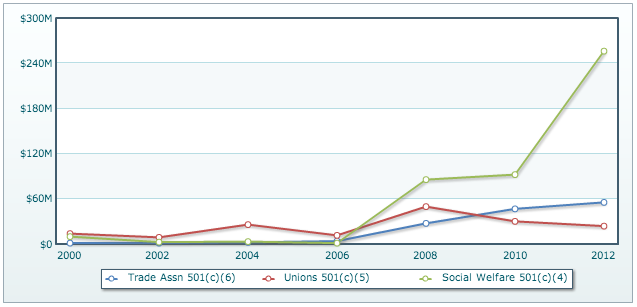More and more money is going into U.S. elections without any disclosure of where it's coming from.
 Courtesy of the Center for Responsive Politics
Courtesy of the Center for Responsive Politics
Source: huffingtonpost.com/
Author: Kathleen Miles
Spending by “dark money” groups -- organizations that do not have to disclose the sources of their political money -- has skyrocketed from about $25 million in 2000 to about $336 million in 2012, according to Federal Election Commission and Internal Revenue Service data that the Center for Responsive Politics, which tracks money in U.S. politics, sent to The Huffington Post.
As CRP’s infographic below shows, the vast majority of dark money can be attributed to so-called "social welfare" groups, considered 501(c)(4) nonprofits. “Social welfare” groups have been a choice form of political spending for everyone from corporations to unions because of the anonymity they provide.
 Courtesy of the Center for Responsive Politics
Courtesy of the Center for Responsive Politics
The initial spike in dark money spending took place in 2008, after the Supreme Court’s 2007 Wisconsin Right to Life ruling. That ruling freed nonprofit 501(c) organizations to make “issue ads” mentioning candidates -- as long as they didn’t directly call for the election or defeat of a candidate.
Another dark money spike took place after the Supreme Court’s 2010 Citizens United ruling freed corporations, labor unions and nonprofit 501(c) organizations to spend political money directly calling for the election or defeat of a candidate. Both the Citizens United and the Wisconsin Right to Life allowed for unlimited spending.
“After Citizens United, voters are left more and more in the dark about who's funding campaigns,” said Robert Maguire, investigator for CRP. “It’s not a matter of free speech – it’s a matter of knowing who’s speaking.”
Dark money continued to flow freely in 2013, gearing up for the 2014 midterm elections. Conservative groups have already spent at least $15.8 million on issue ads to promote Republican candidates, according to an earlier HuffPost analysis. Americans for Prosperity, the nonprofit founded and funded by the billionaire Koch brothers, led all groups that year with at least $12.4 million spent on candidate-specific ads attacking Obamacare. Liberal dark money groups, meanwhile, spent at least $3.3 million on issue advocacy, mostly coming from the League of Conservation Voters.
In November, the Treasury Department and Internal Revenue Service announcedproposed rules that could potentially limit the dark money spending of "social welfare" groups. The proposed guidelines have attracted 143,694 comments to the IRS from both the political left and right.
However, Maguire is skeptical that the proposed rules will make a difference because of the lack of information the IRS collects on "social welfare" groups. According to Maguire, as “social welfare” groups come under increased scrutiny, dark money may increasingly be shuffled instead through 501(c)(6) trade associations, which are also not required to disclose donors to the FEC.
Pamela Behrsin, a spokeswoman for Maplight, a group similar to and collaborating with CRP, said that without donor transparency, Americans have no way of knowing if a candidate is being funded by and thus potentially representing the interests of a corporation or even a wealthy donor in another country.
“We need a democracy where the voice of one person has the same weight as the voice of a wealthy person,” Behrsin said. “Otherwise, if people feel like their voices aren’t heard, they’ll become complacent and won’t be engaged. And that's not a democracy.”
Original Article
Source: huffingtonpost.com/
Author: Kathleen Miles
No comments:
Post a Comment